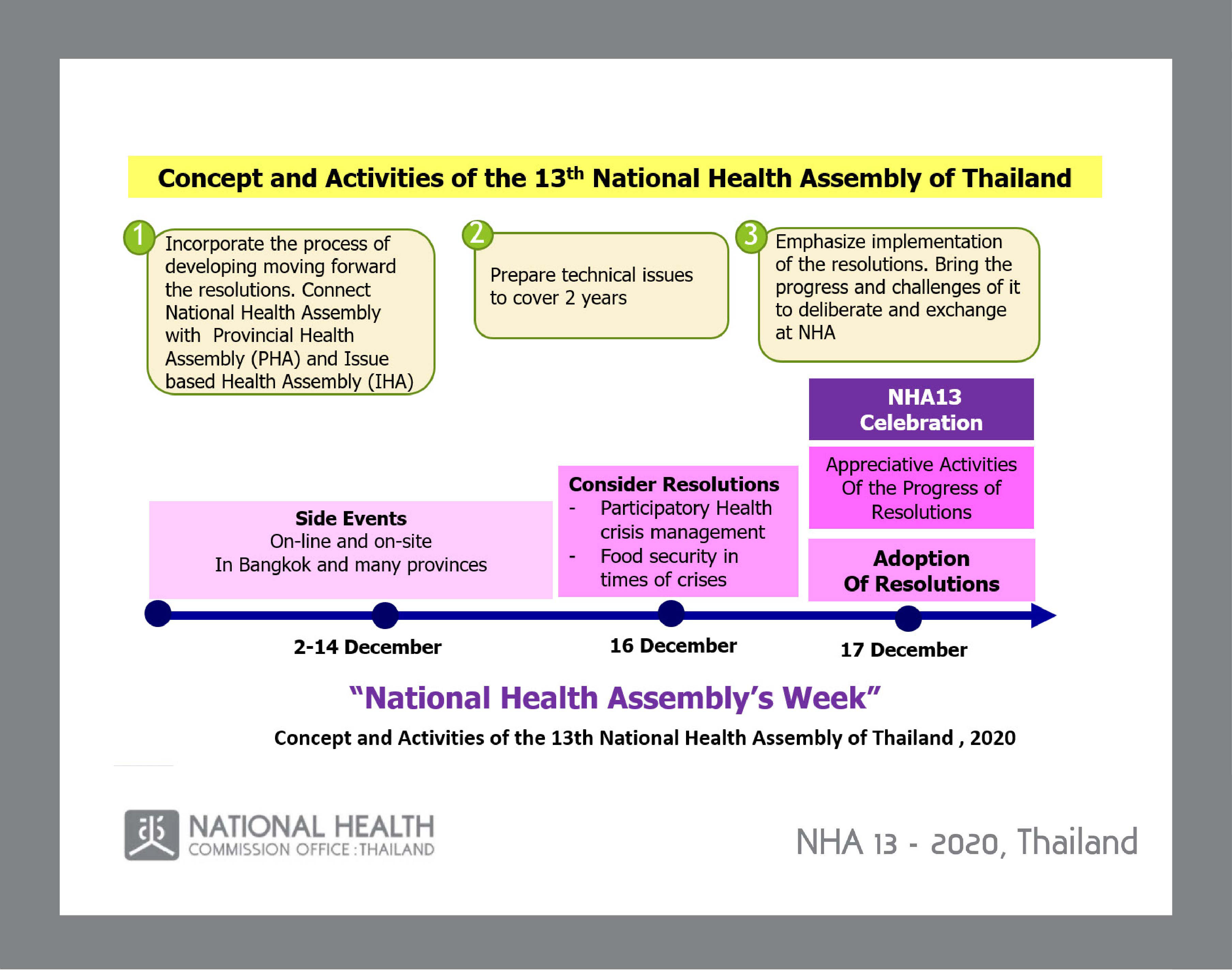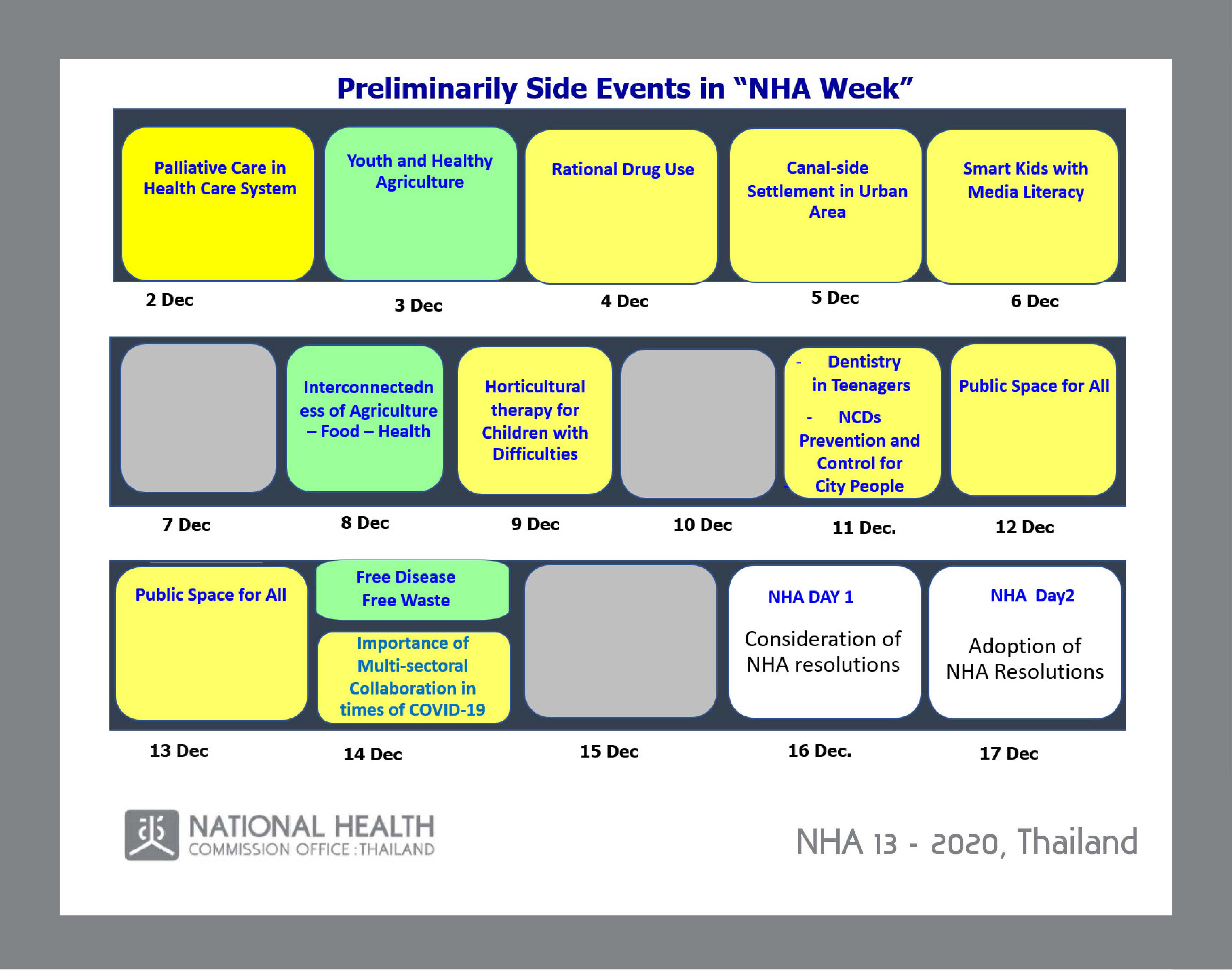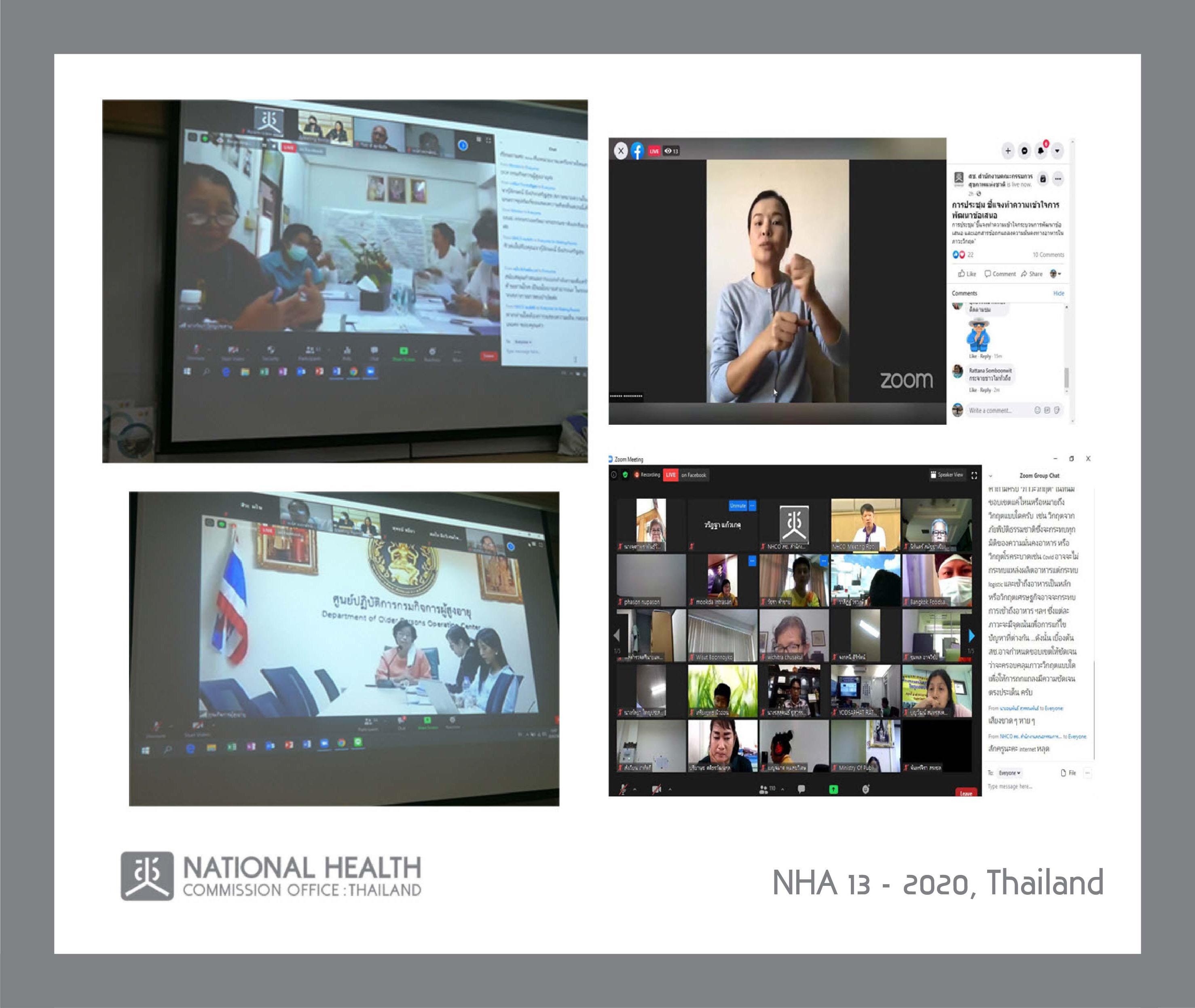The NHA Organizing Committee has decided to convene the 13th National Health Assembly (NHA 13) from 16th– 17th December 2020 at Government Complex, Bangkok, Thailand and NHA week from 2nd-14th December 2020 (online and onsite)
The year 2020 marks a completion of the 12-year cycle of “the National Health Assembly”, a testimony that the national health assembly has served as a tool, under the National Health Act (2007), to satisfactorily solve health problems of the Thai population at policy level as well as at area-based level in a continuing and concrete manner. This is especially true when it comes to problems or issues that cannot be tackled by any organization alone but that require a participatory approach by all social sectors concerned. These sectors work in a concerted manner to bring about public policy leading to practical solutions. The partner agencies work and exchange learning and experience cross-sector with common objectives.
Important principles of National Health Assembly
- It is a process to develop and drive forward participatory healthy public policy by all sectors and stakeholders concerned in setting policy directions and guidelines, taking action, monitoring, making improvements and moving the matter forward on a continuing basis, thereby creating a sense of ownership of the public policy in a systematic and flexible manner.
- It is a participatory democratic process involving extensive deliberation, thereby making it possible for people in society to learn, accept and understand the differences in policy orientation toward self and others, at the same time allowing all sectors and stakeholders to dialogue, learn and make the best of such differences.
- It is a working process based on the strategy of “the triangle that moves the mountain” to solve difficult and complex problems through synergy of knowledge power, social power and political power, attaching importance to proper balance of the three constituencies.
- It is in line with the Charter on the National Health Systems and is connected to both issue-based and area-based health assemblies.

The advent of the 13th year marks a new cycle of the National Health Assembly which sees a number of important changes. The National Health Assembly Organizing Committee for 2020-2021 (NHAOC), under the leadership of Dr. Narongsak Angkasuwapala, has reviewed the process of organizing the National Health Assembly, after studying the evaluation and lessons learned, and come up with the following new concept and guidelines:
- Adjust and integrate two key steps of the National Health Assembly process that is developing draft resolutions and moving adopted resolutions forward. Furthermore, connecting the National Health Assembly (NHA) with the issue-specific and provincial health assemblies (PHA).
- Prepare technical issues of the National Health Assembly to cover two years.
- Attach importance of implementation or moving the adopted resolution forward. Bring this matter to deliberate and exchange with partners from a policy level and an implementation level at the National Health Assembly.
Furthermore, NHAOC set up three sub-committees, namely the technical Sub-committee, the sub-committee on participation and learning and the sub-committee on supporting organization of National Health Assembly, to take further actions.
NHA Theme
Ever since the beginning of 2020 when Thailand and the rest of the world have encountered a coronavirus or COVID-19 pandemic, NHAOC has closely monitored the situation. It is important and necessary for Thailand to acquire participatory public policy recommendations for the problem solving of such magnitude. It, therefore, has come up with a theme for 2020-2021 National Health Assembly, i.e. “Active Citizens’ Power Against Health Crises”. The “active citizens’ power” refers to the fact that the Thai population has a common social responsibility, being aware and ready to participate in the country’s mission. The “health crisis”, on the other hand, refers to all the four dimensions of health – physical, mental, social and spiritual health – in an abnormal situation whether through natural or unnatural causes, thus putting people in danger and affecting health, economy, society or environment in general. This warrants a policy or decision to solve the problem within the limited time.
NHA Sub-theme
Later on, the Technical Sub-committee under NHAOC set sub-themes in light of the main theme, taking into account 3 important principles
- Significance of the issue based on their relevance to the current situation and the degree of their complexity that requires a participatory approach for solution.
- Degree of severity of the problem, i.e. its magnitude and impacts on health, economy, society or environment, and
- Feasibility of translating the policy into good practice.
5 Categories of sub-themes
The sub-committee has announced 5 categories of sub-themes and invited all constituencies to send their comments and recommendations during the course of 2020-2021 so that NHAOC could consider incorporating them in the agenda of the National Health Assembly accordingly. The 5 categories are:
- Health crisis from emerging diseases;
- Natural resources and environment versus health crisis;
- Four basic needs in time of crisis;
- Health crisis of various groups of people; and
- Health crisis and online society
Agenda/Resolution Development
In addition, the Technical Sub-committee, together with the Sub-committee on Participation and Learning also under NHAOC, has designed the process for developing participatory public policy and social movement. In this matter, the constituencies are requested to send their comments on NHA points for discussion. This initial process is to provoke constituencies to deliberate critical issues and collect their idea. Based on the ideas and opinions received, documents for the agenda of the meeting will be developed. There are three kinds of documents:
- Main Document
- Draft Resolution
- Road Map
Public Hearing
There is also a public hearing process whereby every constituency will give their respond to the draft agenda of the meeting by written documents or via virtual meetings. New issues under each category of sub-themes can be proposed during public hearings.
Changes in the National Health Assembly
A new change is organizing the National Health Assembly Week.
Traditionally, it was held for three days but will be reduced to two days during 16-17 December 2020. Activities will be decentralized and held locally in various provinces, thus covering more grounds and allowing constituencies to participate more fully, all acting as part of the National Health Assembly process. Activities will be held for two weeks continuously before the start of the main event.
Another change is greater use of technology to connect the national event with provincial events through virtual meetings. This helps to reduce the size of the Assembly and the number of constituencies at the Assembly, taking into consideration social distancing practice and other measures in light of the changing COVID-19 situation.
Agenda of the 13th National Health Assembly 2020
Upon the Technical Sub-committee’s announced invitation, constituencies have submitted 56 proposals, 47 of which fall under the 5 categories of sub-themes. On 17 September 2020, NHAOC announced two items of the draft agenda of the meeting for the 13th National Health Assembly: (1) food security in time of crisis and (2) participatory health crisis management in case of pandemics. It entrusted the Technical Sub-committee to organize a process of developing proposals (draft resolutions) for public policy, attaching importance to the participatory process of constituencies concerned and correct technical information to be put forward for consideration at the 13th National Health Assembly, 16-17 December 2020.
National Health Assembly Week : 2-14 December 2020

The Participation Sub-committee provides support for the organization of side events of constituencies during the National Health Assembly Week intends (1) to allow constituencies, both provincially and centrally located, to participate in social movements in policy-oriented issues more extensively and (2) to open up space for learning about the participatory public health, in other words the “health assembly process”, with its multi-dimensional and socially inclusive character. The design of side events covers issues that correspond with the main theme and sub-themes of the National Health Assembly. The issues could also come from the implementation of the area-based/issue-specific health assemblies and the National Health Assembly or have something to do with the public policy of the constituencies along the line of “Health in All Policies”. For example, side events on the implementation of National Health Assembly resolutions will provide concrete evidence showing how much progress has been achieved, success factors, and issues to be further taken.
The hybrid form of National Health Assembly: 16-17 December 2020
The Sub-committee on Supporting Organization of National Health Assembly under NHAOC has come up with a new design of organization taking into account the COVID-19 situation. At its 4/2563 meeting on 11 August 2020, NHAOC approved the organization of the 13th National Health Assembly 2020 in a hybrid form integrating greater technological application to reduce the size of the gathering and the number of travels of constituencies, observing social distancing, showing flexibility in handling the COVID-19 situation, and decentralizing the event online to all areas of the provinces. The National Health Commission Office (NHCO) will coordinate the cooperation with the Ministry of Public Health in the organization of the event. Provincial public health offices will serve as the platform for online meeting linking with the central body. The benefits of the online meeting of the National Health Assembly are (1) minimizing travel that could be potential risk of disease, (2) allowing the constituencies to choose the topics of their interest and time availability in many ways, (3) allowing the constituencies and wider participants to attend in the event (4) making it possible to exchange information across more areas. At any rate, contingency plans are prepared to accommodate new changes that may occur particularly in the event that a new wave of COVID-19 may spread toward the end of the year.



